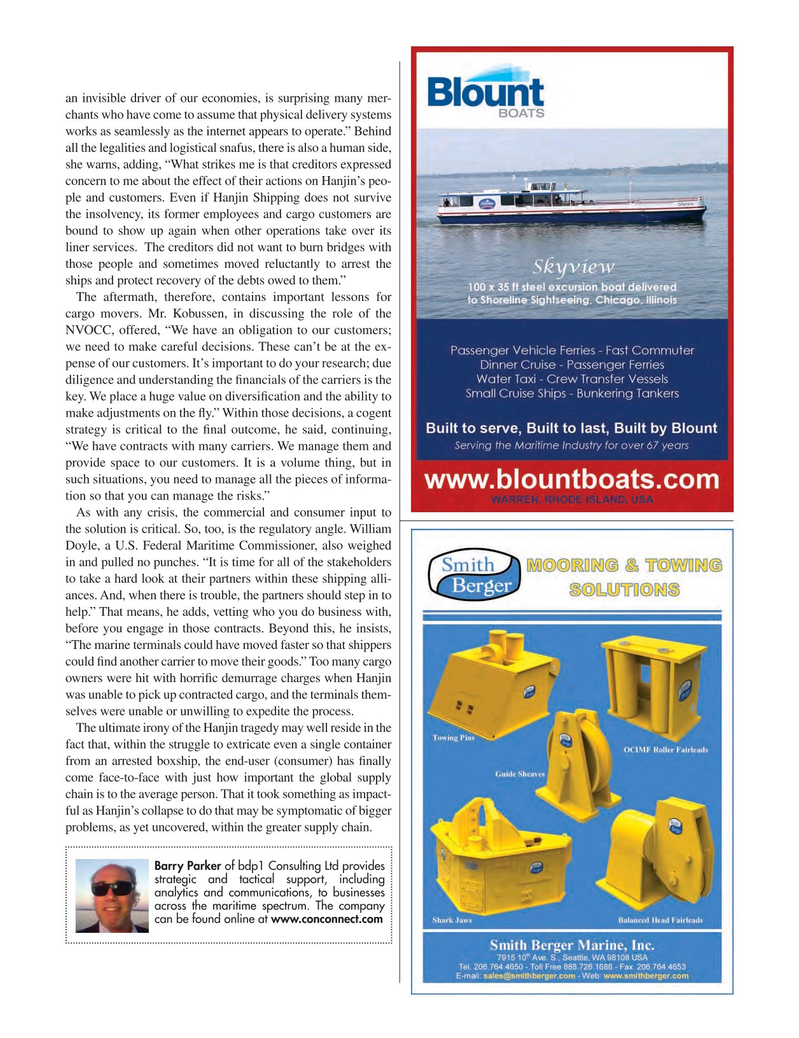
Page 29: of Maritime Logistics Professional Magazine (Q4 2016)
Workboats
Read this page in Pdf, Flash or Html5 edition of Q4 2016 Maritime Logistics Professional Magazine
an invisible driver of our economies, is surprising many mer- chants who have come to assume that physical delivery systems works as seamlessly as the internet appears to operate.” Behind all the legalities and logistical snafus, there is also a human side, she warns, adding, “What strikes me is that creditors expressed concern to me about the effect of their actions on Hanjin’s peo- ple and customers. Even if Hanjin Shipping does not survive the insolvency, its former employees and cargo customers are bound to show up again when other operations take over its liner services. The creditors did not want to burn bridges with those people and sometimes moved reluctantly to arrest the ships and protect recovery of the debts owed to them.”
The aftermath, therefore, contains important lessons for cargo movers. Mr. Kobussen, in discussing the role of the
NVOCC, offered, “We have an obligation to our customers; we need to make careful decisions. These can’t be at the ex- pense of our customers. It’s important to do your research; due diligence and understanding the ? nancials of the carriers is the key. We place a huge value on diversi? cation and the ability to make adjustments on the ? y.” Within those decisions, a cogent strategy is critical to the ? nal outcome, he said, continuing, “We have contracts with many carriers. We manage them and provide space to our customers. It is a volume thing, but in such situations, you need to manage all the pieces of informa- tion so that you can manage the risks.”
As with any crisis, the commercial and consumer input to the solution is critical. So, too, is the regulatory angle. William
Doyle, a U.S. Federal Maritime Commissioner, also weighed in and pulled no punches. “It is time for all of the stakeholders to take a hard look at their partners within these shipping alli- ances. And, when there is trouble, the partners should step in to help.” That means, he adds, vetting who you do business with, before you engage in those contracts. Beyond this, he insists, “The marine terminals could have moved faster so that shippers could ? nd another carrier to move their goods.” Too many cargo owners were hit with horri? c demurrage charges when Hanjin was unable to pick up contracted cargo, and the terminals them- selves were unable or unwilling to expedite the process.
The ultimate irony of the Hanjin tragedy may well reside in the fact that, within the struggle to extricate even a single container from an arrested boxship, the end-user (consumer) has ? nally come face-to-face with just how important the global supply chain is to the average person. That it took something as impact- ful as Hanjin’s collapse to do that may be symptomatic of bigger problems, as yet uncovered, within the greater supply chain.
Barry Parker of bdp1 Consulting Ltd provides strategic and tactical support, including analytics and communications, to businesses across the maritime spectrum. The company can be found online at www.conconnect.com 18-33 Q4 MP2016.indd 29 11/10/2016 10:32:18 AM

 28
28

 30
30
